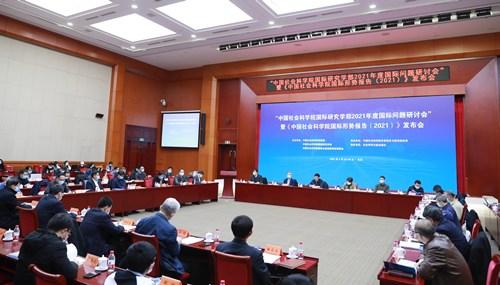
CASS releases the 2021 Report on the International Situation in late February. Photo: Zhu Gaolei/CSST
The 2021 Report on the International Situation by the Chinese Academy of Social Sciences (CASS) was released in Beijing in late February.
Edited by CASS President Xie Fuzhan, the book comprehensively analyzes the economic, political, social, security situation and hot issues in major countries and regions in 2020. The report also predicts the global situation, and the world pattern’s main development trends in 2021. Researchers under the Academic Division of International Studies at CASS contributed to the book.
In his keynote speech at the launch event, Xie pointed out that after experiencing a downturn amid the COVID-19 pandemic, the world economy will resume growth in 2021 on a low base. Factors supporting the restorative growth of the world economy include the restoration of supply as expanding vaccinations help curb the pandemic, the release of demand that was previously compressed and postponed due to the pandemic, and initial effects of stimulating macroeconomic policies.
Although the world economy is expected to restart growth, risks and challenges that may hinder or even interrupt economic recovery still exist. The foundation of the world economic recovery is relatively weak, and it faces a potential threat from insufficient continuity and poor coordination of macroeconomic policies among countries. In addition, uncertainty stemming from the pandemic also poses challenges to economic recovery. “These risks deserve great attention,” Xie concluded.
Zhang Yuyan, director of the Institute of World Economics and Politics at CASS, summarized global economic performance in 2020 in terms of economic growth, prices, unemployment, trade and cross-border investment, prices for staple commodities, asset prices and exchange rates, and government debt, analyzing the worst decline in the world’s economy since World War II. He said that the main uncertainty factor affecting the world’s economic outlook in 2021 is still the pandemic, although fiscal relief policies and very loose monetary policies implemented by the world’s major economies will also play a role. The world economic growth rate in 2021 is estimated to be between 4.5% and 5.5%, and major economies may show an uneven recovery of different speeds and strengths.
Sun Zhuangzhi, director of the Institute of Russian, Eastern European, and Central Asian Studies at CASS, predicted that Russia’s internal affairs and diplomacy will undergo a huge test in 2021. The outlook of Central Asia and the South Caucasus region is not optimistic. The development of Ukraine, Belarus, and Moldova will still be sluggish. The development of this region presents a general trend which is “unoptimistic, uncertain, unstable, and unbalanced.”
In 2020, the European economy dropped by nearly 7% year-on-year. The European Union and its member states have successively launched economic stimulus plans, but the growth momentum is insufficient. Tian Dewen, deputy director of the Institute of European Studies at CASS, said that as German politics enters the post-Merkel era, and Europe-US relations improve under Joe Biden’s presidency, Europe’s internal and external affairs may witness significant changes in 2021. This will have an important impact on China-EU relations and even the world pattern.
The African economy is expected to stabilize and rebound, supported by structural adjustment and reform measures introduced by African nations, and driven by the African Continental Free Trade Area agreement, according to Li Xinfeng, director of the Institute of West-Asian and African Studies at CASS.
“In 2020, due to the impact of the pandemic, the Latin American economy was in line with the global recession, to an even more severe degree than average,” said Chai Yu, director of the Institute of Latin America at CASS. In 2021, with the Biden administration coming to power and China’s rising influence in Latin America, Latin America may become more relevant for US diplomacy. The complementary foundation of China-Latin America relations is still solid, and the two sides still have broad room for cooperation in such areas as the digital economy and COVID-19 vaccines.
In the Asia-Pacific region, regional cooperation achieved breakthroughs in 2020 but remains fragile. Li Xiangyang, director of the National Institute of International Strategy at CASS, focused on reshaping regional value chains. He said that with the trend of “shortening” and “regionalization” of global value chains, Asia may see two parallel regional value chains, one with the US and Europe as the final consumer market, and the other with China as the final consumer market.
The US economy will probably move out of recession in 2021, but the recovery will be limited due to structural problems, predicted Yuan Zheng, deputy director of the Institute of American Studies at CASS. Trumpism will continue to exert an impact. Under the Biden administration, the US will moderately return to the routine of liberal internationalism, pursue multilateral diplomacy, and strive to play its role as a global leader.
After maintaining stability for eight years, Japan’s political situation fluctuated again in 2020, with the economy suffering a serious decline. Yang Bojiang, director of the Institute of Japanese Studies at CASS, said that the pandemic’s fallout has prompted Japan to respond in many ways, such as accelerating a digital transformation, looking for new growth points, optimizing the industrial chain and supply chain, and adjusting investment layouts. In this context, China-Japan relations have both potential risks and opportunities for cooperation.
Add: #5 Jianguomennei Street, Beijing, 100732,P.R.China
Copyright by CASS. All Rights Reserved

